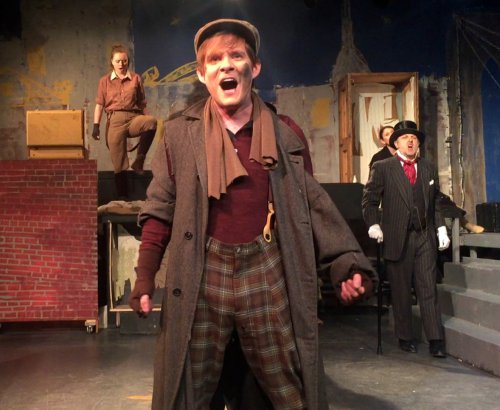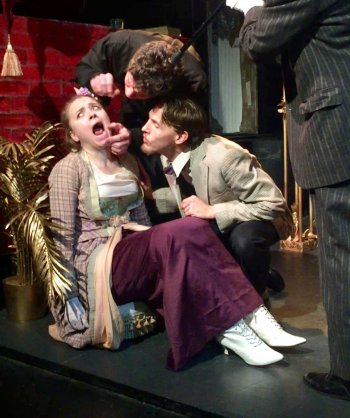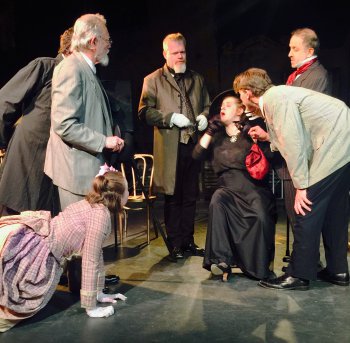Bound to Rise
Ambitious musical adaptation of four Horatio Alger rags-to-riches stories gets inept and amateurish revival at same theater where it won an Obie Award in 1985.

Justyna Kostek, Jonathan Emerson and Scott Schutzman in a scene from “Bound to Rise” (Photo credit: Don Rittner)
[avatar user=”Victor Gluck” size=”96″ align=”left” ] Victor Gluck, Editor-in-Chief[/avatar]Bound to Rise, the Horatio Alger musical, first appeared at the Medicine Show in 1985 and won director Barbara Vann an Obie Award for her staging. It was again revived in 1997. Vann passed away in 2015 and the Medicine Show is announcing a new era with this revival. Unfortunately, this inept and amateurish production is not much of a tribute to the theater’s founder.
Alger, who is not much read today, was a best-selling novelist, mostly among teenage boys, during the so-called “Gilded Age” of tycoons, con-men, immigrants, robber barons, street urchins, prostitutes, and anarchists. He is credited with popularizing the terms “American Dream,” “rags-to-riches” and “street arabs.” Turning out 114 of these potboilers from 1864 to 1899 in fast succession, plus 100’s of stories and poems, he was not taken seriously by the critics who saw the novels as written to the same formula with simply the names changed: a poor boy makes good with hard work, ingenuity and a bit of luck from an older mentor. This came to be known as the Horatio Alger Myth.
With book and lyrics by Stephen Policoff and music by Robert Dennis (Oh, Calcutta!, Sesame Street), Bound to Rise weaves stories from four of Alger’s didactic and melodramatic rags-to-riches stories into one plot, including Ragged Dick, Helen Ford, Mark the Match Boy, and Walter Sherwood’s Probation. It also uses the writings of muckraking journalist and social reformer Jacob Riis to set the record straight. He appears as a character called Joseph Root who wanders through the story interacting with various characters as he offers to interview them or take their photo. Christopher Hirschmann Brandt, the Medicine Show’s actor-manager, gives the evening’s best performance but he is not on stage often enough to have much of an effect on the proceedings.

Justyna Kostek and Richard Keyser in a scene from “Bound to Rise” (Photo credit: Don Rittner)
The musical brings together four of Alger’s iconic characters who meet up with each other in New York where they have come to try their fortune: college student Walter Sherwood must leave Yale and the affluent life he knew when he is told by his guardian that his fortune has been lost. Helen Lord leaves Connecticut to try her luck in earning $758 dollars to save her mother’s home. Mark Manton, a match seller, leaves his greedy and selfish step-mother in Philadelphia to find a better life, an illiterate but plucky Dick Hunter, nicknamed “Ragged Dick,” is a Manhattan bootblack who longs for more security.
Each has a benefactor who looks out for them along the way or they stumble into some good fortune after a series of setbacks. The musical depicts a time when American society was literally two classes: the haves who lived in palatial mansions and the have nots who likely lived in crowded tenements or on the streets. One of the more striking episodes depicted is the annual Champagne Ball at which this year the millionaires dress in expensive rags to parody a “poverty social,” an event costing a small fortune.
Unfortunately, Policoff’s book is too cluttered with characters to allow for much development. While some of his lyrics are clever, most are prosaic and heavy-handed. As played by music directors Gregory Nissen and Jonathan Matthews, the score sounds tinny, rather than melodic, for its 1890’s period. The direction by Oliver Conant, with an assist by Paul Murphy and Regan Batuello, is all over the place using various parts of the shabby (uncredited) set, so that it is too busy for its own good. This free-wheeling approach would be more suitable to a movie rather than the stage without a much stronger hand in control. Occasionally the actors make a pithy remark about society or the political order and then freeze, staring at the audience. This Brechtian technique goes against the grain of the rest of the production, as does various characters narrating themselves or others.

The cast of “Bound to Rise” (Photo credit: Don Rittner)
Worst still is the indiscriminate casting with performers mostly mugging their way through Alger’s bathetic plotlines. The 14 member ensemble is made up of actors who also sing, rather than singers who also act. Most are off key most of the time even in the choral numbers. Jonathan Emerson’s Ragged Dick, Justyna Kostek’s Helen, Paolo Solis’ Walter, and John Cencio Burgos’ Mark Manton all seem too old to be playing teenagers, though to their credit they do create consistent and different characters. As a crafty and wicked tycoon, Scott Schutzman’s hamming is straight out of melodrama, while Richard Keyser’s Conrad, ward to the wealthy and philanthropic Mrs. Hamilton, is too obviously greedy and conniving to fool anyone. Only Beth Griffith has a real handle on her role as a member of the four hundred, and is the only one with a real singing voice in evidence.
The single most successful element of the evening is the colorful period costumes by Derek Lockwood that differentiate the two classes. The lighting by Daniel Schreckengost fails to dim out the many set pieces grouped along the stage walls when they are not in use so that the eye tends to wander all over the stage throughout the evening. One would be hard pressed to give a fair critique of this libretto and score from the disappointingly mediocre production now on the stage of the Medicine Show Theatre.
Bound to Rise (through February 26, 2017)
Medicine Show Theatre, 549 W. 52nd Street, Third Floor, in Manhattan
For tickets, call 212-262-4216 or visit http://www.medicineshowtheatre.org
Running time: two hours and 25 minutes with one intermission






Leave a comment